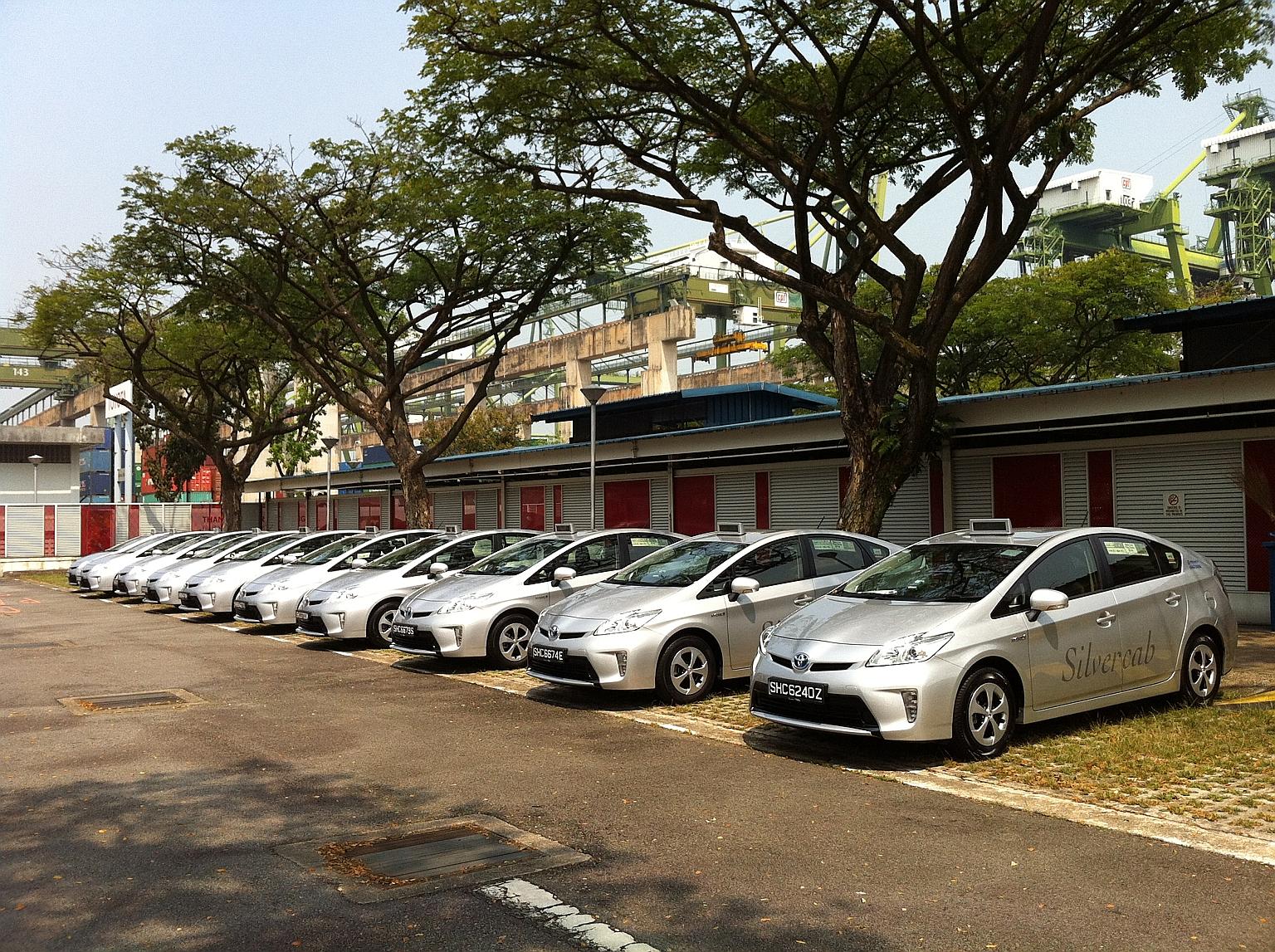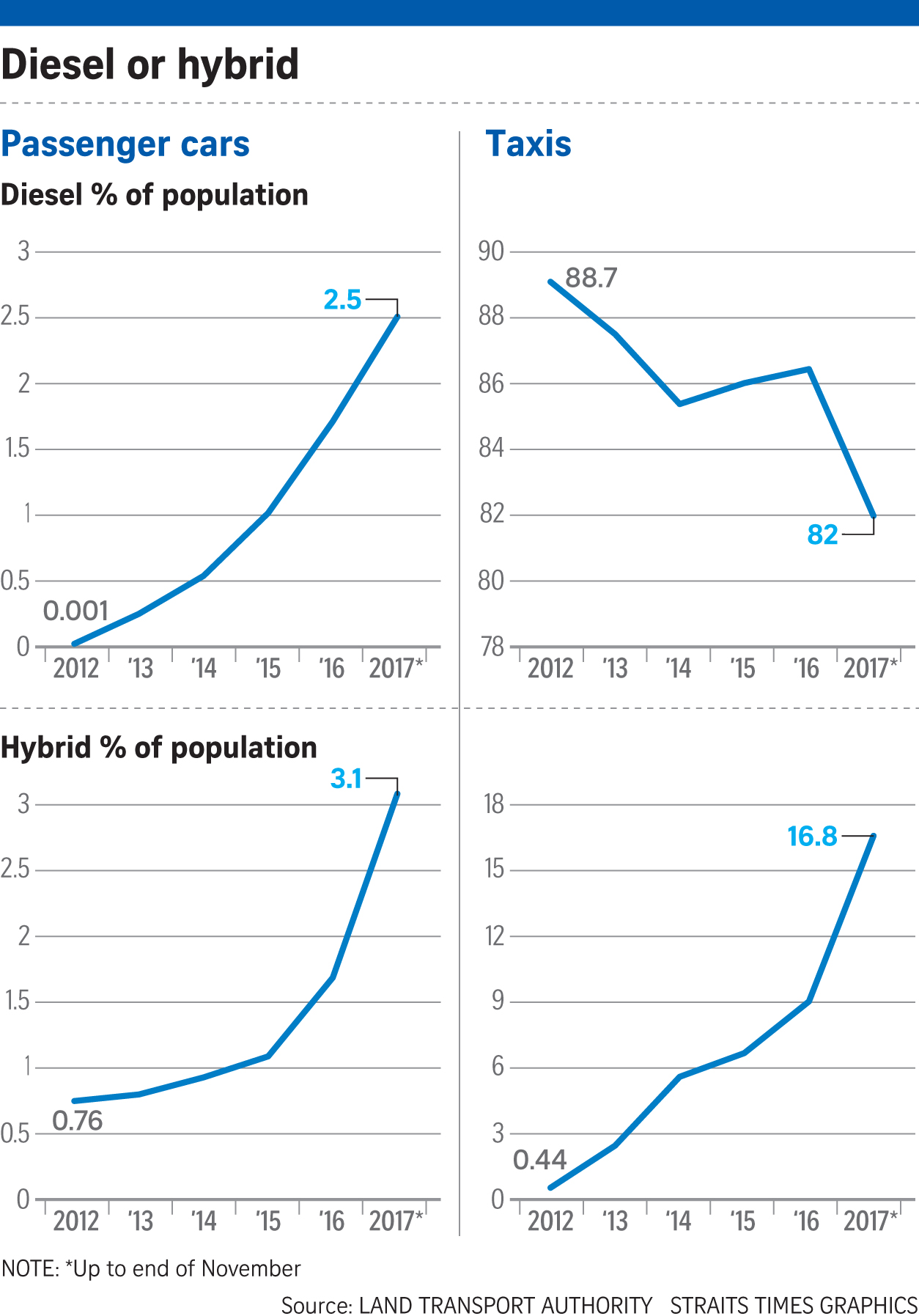Hybrid cabs zoom ahead
Petrol-electric taxis now make up about 17% of fleet, compared with none just a decade ago
Sign up now: Get ST's newsletters delivered to your inbox

According to LTA statistics, there were close to 4,000 hybrid taxis on the road as at the end of November last year. In 2008, there was not even one . Since taxis clock more than three times the mileage of an average passenger car, observers reckon the migration from diesel to hybrid would contribute to cleaner air.
PHOTO: PREMIER TAXI
Follow topic:
Close to one-fifth of Singapore's taxi fleet is made up of petrol-electric hybrid models - up from zero just 10 years ago - and experts say the trend has a positive, if small, impact on air quality.
According to Land Transport Authority statistics, there were close to 4,000 hybrid taxis on the road as at the end of November last year, making up about 17 per cent of the cab population. In 2008, there was not a single hybrid taxi here.
Petrol-electric hybrids, which are powered by a petrol engine paired with one or more electric motors, have grown in popularity with the general motoring public, too.
There are now around 20,000 hybrid passenger cars here, making up more than 3 per cent of the population - four times what it was in 2012.
An emissions-based taxation scheme has fuelled the trend because it accorded for up to $30,000 and $45,000 in rebates for hybrid cars and taxis, respectively.
The same scheme has made diesel passenger cars more popular. The cohort has grown by more than twentyfold since 2012 to reach nearly 15,000 units as at last November, or 2.5 per cent of the population.
Since taxis clock more than three times the mileage of an average passenger car, observers reckon the migration from diesel to hybrid would contribute to cleaner air.

Asian Clean Fuels Association director Clarence Woo said: "This is definitely good news. The World Health Organisation has classified particulate matter - which diesel engines produce more of - as carcinogenic. And diesel emissions on the whole are also carcinogenic. So, here, we are really killing two birds with one stone."
Diesel proponents have pointed out that diesel engines produce less carbon dioxide. And that they produce more torque, making diesel vehicles more driveable in the city.
Mr Woo, however, said hybrids are just as efficient, adding that petrol engines have also improved in the power department.
Mr Neo Nam Heng, chairman of diversified motor group Prime, said almost all his taxis are now hybrid.
Prime Taxi, which has around 700 cabs, was the first to roll out hybrid models back in 2009. Mr Neo said: "A diesel Hyundai Sonata averages around 8 cents per km. A Toyota Prius (hybrid) matches that.
"The other thing is, taxi drivers can go to any of the 100-plus petrol stations to fill up. They don't need to drive all the way back to their own depots to buy diesel. Again, this saves time and fuel."
Hybrid opponents point to the cost of battery replacement as a deterrent. Authorised Toyota dealer Borneo Motors charges $5,200 to replace a Prius hybrid battery.
Mr Neo said: "We bring in our batteries. And we supply to others, at $2,200 each.
"And don't forget, a hybrid taxi is not liable for annual diesel tax."
The tax was $5,100 a year, reduced to $4,250 from last February.
The popularity of hybrids may wane from this year, though.
This is because the stricter Vehicular Emissions Scheme accords smaller rebates for such vehicles.
For instance, the Toyota Prius now falls in the Neutral band, attracting no rebate - down from a rebate of $30,000. The scheme is also likely to make it more punitive to buy a diesel car.
Singapore University of Social Sciences transport researcher Walter Theseira said: "Diesel used to be the preferred choice for high-intensity light vehicle use because of superior fuel economy and durability.
"But now scientific evidence suggests the pollution gap between diesel and petrol is large and may not narrow much in the real world.
"Hybrids which offer superior fuel economy fill the gap. Their durability has also been proven in fleet use across the world."

